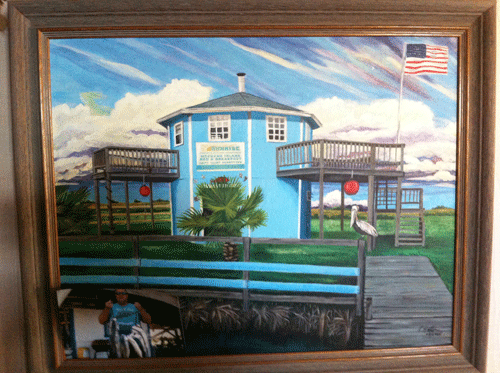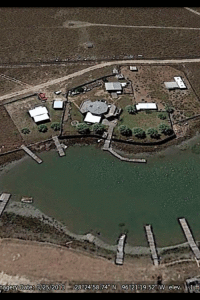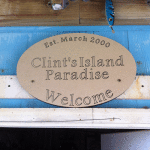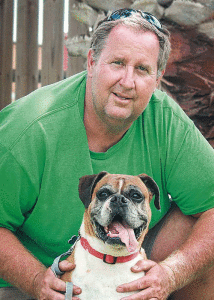
Clint’s Island Paradise as it was about 10 years ago, painted by Phyllis Hatton.
Some have told me that I am living their dream, while others have said that I must be out of my mind.
In March 2006 I retired from the Victoria Police Dept. after 22 years of service, having performed those duties for exactly half of my life. Though I’ve missed the camaraderie, it was time to move on, and I’ve never looked back.
In January 2000 I had purchased an acre of undivided interest on this barrier island, four miles across Matagorda Bay from mainland Port O’Connor, TX. The property is accessible by boat only, and the proper name for it is Matagorda Peninsula, even though in reality it is an island, becoming so in 1962 when the Corp of Engineers cut a quarter mile wide swath through the peninsula, making this piece of land completely surrounded by water. This enormous dredging project, now called the Big Jetties, created a jetty passageway for ships and tankers to access the local industrial factories via the Gulf of Mexico. The barrier island is roughly four miles long and 3/4 mile wide, totaling 1,500 acres.
With the help of a skilled carpentry friend, Louis Boldt, construction slowly began on an octagon designed two-story cabin, 600 square feet total. I boated 225 bags of Kwik-Crete across the bay, 20 bags at a time (that’s 18,000 lbs!), to pour a slab first, mixing four bags at a time. Keep in mind that ALL materials must come by boat across an often times rough open water bay, so the building process was slow and very laborious.
The day finally arrived when the cabin was dried in, so now I could at least get out of the weather and not have to boat back to the mainland at the end of each day that we were constructing. Other than some native salt water cedars in one area of the island, there are no trees, so I would have to put my own saplings in the ground. But would anything even grow on a barrier island surrounded by salt water?
Finding a source of fresh water would be vital in staying out here and any hopes of growing anything. I learned that provided you get far enough back from the bay shoreline, at least a quarter mile, an underground fresh rain water basin could be utilized. Fresh water is less dense than salt water, therefore it remains suspended above the salt water level. Sure enough, using a gasoline powered post-hole digger with extension, there was fresh water about 12 feet down. A four inch PVC sand point and casing was pushed down, and an above ground 12 volt Flojet pump was used to pull the water up through a half inch PVC pipe inside the casing. A solar panel keeps the single deep cycle battery charged that operates the pump. This fresh water was also used to mix the 225 bags of Kwik-Crete for the cabin foundation. I’ve had this fresh well water system for 16 years total now, using it for all of my outside water needs.
Having fresh water, I then began getting a grass yard and trees started. Laying down about twenty 10”x10” squares, I was able to get a St. Augustine grass yard growing, and it has done really well over the years, bouncing back even after being covered with salt water from hurricanes. In May 2002 I planted six small palms, 16 inches tall, across the front yard, and these palms are now over 20 feet tall! I’ve also been able to grow beautiful Norfolk pines, fig trees, a magnolia and other various plants and bushes.
After retiring in March 2006, I moved to the island full time, making it my only residence, having no dwellings of any kind on the mainland, and I have no regrets. My inside cabin water is rain water that I collect in two 500 gallon tanks, pumped into the cabin with another 12 volt pump connected to a battery bank with solar panels on the roof. My lights and ceiling fans are also 12 volt, and several inverters tied into the battery system operate any 110 volt items, including a TV that I have primarily to keep track of the tropics during hurricane season. My fridge, freezer, stove, water heater and winter heater all operate off propane, using 5 and 10 gallon tanks that I transport to the mainland to be filled.
Being conservative comes without even thinking about it now. It’s amazing how much a person can conserve, and do without, when you live completely off-grid and rely on Mother Nature for power and water. I have a generator that I use for a washing machine, and for drying them I use a solar clothes dryer … also known as a clothes line. The first few summers I also used the generator to occasionally run a window AC unit, but it hasn’t been turned on in over seven years now. I’ve pretty much acclimated myself to the sultry south Texas weather conditions here on the island. Plus, I hate the noise of a loud generator.

Aerial view of island compound
In 2008 I began my gardening and chicken raising endeavors, constructing raised planting beds, using a portion of island soil and hauling across bags of top soil, and also mixing in organic fertilizers of lime, seed meal and bone meal. I also began making my own compost using fresh grass clippings, cow manure, chicken manure, coffee grounds and sea weed that I collect from the beach and rinse off. I’ve also made raised planters from plastic 30 and 55 gallon barrels that wash ashore, cutting them in half lengthways. With gardening advice from my dad and lots of reading, I have grown wonderful tomatoes, peppers, squash, watermelons and cantaloupes. I also built a small greenhouse where I start everything from seeds before planting into the ground. There is a real sense of satisfaction being able to eat a delicious vine ripened tomato that you started from a tiny seed.
In September 2008 I built a chicken pen and coop, and began raising chickens, starting out with eight, and eventually having as many as fifty chickens. I’ve settled into getting 20 new baby chicks, and a few baby guineas, every three years when it’s time to replace the old ones. I order the chicks/guineas and they arrive at the Post Office, three days old and always very healthy. I love having chickens, and I use the surplus eggs to sell and barter with.
I go by boat to the mainland for supplies and to check for mail every 7-10 days, depending on weather conditions. I enjoy scouting the beach and bay shoreline for what treasures may have washed up. The only wildlife to speak of on the island are a few raccoons, coyotes and unfortunately an abundance of rattlesnakes. I’ve killed 26 rattlers since living full time out here, five of them within twenty feet of my front door! Funny story, years ago I received an email from a guy reading my articles, saying I shouldn’t kill the rattlesnakes, they are living creatures and should at least be re-located. I replied back that I would gladly attempt to capture and relocate them to his yard, I simply needed his address. . he never replied back. Idiot.
I truly love living on this barrier island, and being largely self-sufficient. My goal is to become more and more so, knowing that I’ll never be 100% self-sustaining, but I can try. I cannot imagine having to reside back on the mainland, and God willing, will never have to do so. I rarely get lonely out here on the island, but instead enjoy the peaceful solitude. My saddest day on the island, without question, was my faithful and beloved first mate boxer, Barnacle, drifting off to heaven as I held him in my arms. He now watches over me from above, and looks forward to me getting another puppy soon, and we will name him Corky.
In April 2014 I inherited two 2-week old kittens after they were found in the anchor box of a fellow islanders boat while it was parked on the mainland. Not knowing the kittens were there, the anchor was thrown off the side of the boat and one of the tiny kittens became entangled in the rope and went overboard. The kitten was rescued and I named her Anchor, and her sister I named Jetty. I bottle-fed the sister kittens for several weeks, and now they are beautiful cats that do a wonderful job in keeping my rat population in check.
 I’ve met so many wonderful people during my years out here on the island. True islanders are good people, always willing to help when called upon, especially Bubba, Joe, Chuckie and Leo.
I’ve met so many wonderful people during my years out here on the island. True islanders are good people, always willing to help when called upon, especially Bubba, Joe, Chuckie and Leo.
Being an off-grid homesteader on a barrier island surrounded by billions of gallons of salt water can be accomplished, it simply takes determination. . . and maybe being a little bit out of your mind.
CLINT BENNETSEN is a retired police detective and now lives full time on Matagorda Peninsula Island, and writes a monthly column for the Dolphin Talk. To comment or ask questions of Clint, he can be contacted at ccbennetsen@yahoo.com or dolphin1@tisd.net.

